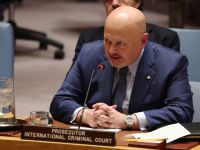The military wing of Syria’s biggest Kurdish party employs child soldiers in its fight against Al-Qaeda in areas where abuses in detention and arbitrary arrests are also rife, an international watchdog says.
In a report published today, Human Rights Watch accuses the Democratic Union Party (PYD), which in alliance with a number of smaller Kurdish parties declared self-rule over three enclaves in northeast Syria in January, of harassing and arbitrarily arresting political opponents while turning a blind eye to abductions and murders committed under its jurisdiction.
The PYD is in de facto control of Afrin, Ain al-Arab and Jazira, running them as ministatelets, complete with their own courts, police and prison system, making the enclaves a good example of the kind of autonomous state stretching from north Syria across to eastern Iraq that the Kurds hope to eventually control.
However, HRW says that the PYD is failing to protect the basic rights of citizens, particularly political opponents and children, although it has taken some positive steps to enshrine individual rights through a new constitutional law.
In the report, “Under Kurdish Rule: Abuses in Kurdish-run Enclaves of Syria,” the watchdog documents cases of individuals charged with petty crimes who were attacked by the police force, known as the Asayish, and forced to confess under torture.
“They punched me in the head, face and stomach ... I didn’t confess right away, and they beat me. ... They started to beat me on part of my legs ... bottom of my feet ... with a thick stick ... My eyes were blindfolded. Two people held my legs. They caused a big shock. They used electricity also. Because my flesh can’t handle the stick, I confessed,” one former detainee recounted to HRW. Several people have died as a result of attacks in jail, the report says.
Alongside abuses in prison for apparently minor crimes, arbitrary arrests of PYD political opponents are also common, HRW says.
In April, 13 people had been convicted of bomb attacks and were sentenced based on confessions made under torture, an official with knowledge of the cases said. The opposition Kurdish Democratic Party of Syria, from which five of the convicted hailed, slammed the verdicts as “politically motivated.”
“You can’t say anything because they’re the power,” the daughter of one of the men told Human Rights Watch, referring to the PYD.
The watchdog also accuses the PYD of failing to properly investigate unsolved disappearances, such as of KDPS leader in Malikieh, Bahzed Dorsen, who vanished on the border with Iraq in October 2012. His family blames the PYD, and although HRW does not have evidence to assign blame for his disappearance, it is clear that the PYD has failed to properly look into his abduction.
Since assuming power at the end of the 2012, the PYD’s military wing – the People’s Protect Units (YPG) – and the Asayish have used boys and girls under 18 to internally police enclaves and on the front lines in their war against Al-Qaeda.
HRW interviewed several soldiers who said they were underage.
“They [YPG] would talk to us about the Kurdish situation and explain the importance of defending the [Kurdish] nation,” a 16-year-old told HRW. “It is our choice to join ... My mom and dad were against it and said no but I wanted to.”
In one case, a man whose 17-year-old son had joined the YPG, said he knew of children who had been sent to the front lines, some of whom had died.
Two separate U.N. reports last year documented the use of child soldiers as young as 14 by the YPG who were directly fighting the Al-Qaeda-affiliated Nusra Front.
In a positive development, on June 5 the YPG publically admitted that the use of child soldiers was an ongoing problem and pledged to demobilize all underage fighters within a month and cease the recruitment of children.
In areas of social justice, too, the PYD is trying to reform.
The introduction of a new constitutional law brought into effect in January upholds some important tenants of international human rights. In particular it bans the death penalty, marking it out from Syrian law under which the practice was legal.
The Social Contract also enshrines the independence of the judiciary and guarantees the right to a fair trial, clauses that it nonetheless fails to uphold in cases of political prisoners, HRW argues.
“The Kurdish leadership in northern Syria can do much more to protect the human rights of everyone in the areas it controls – Kurds, Arabs, Syriacs, and others,” Nadim Houry, deputy Middle East and North Africa director at HRW says. “The Kurdish-run areas are quieter than war-torn parts of the country, but serious abuses are still taking place ... The PYD is firmly in charge, and can halt the abuse.”
By Nadia Massih








